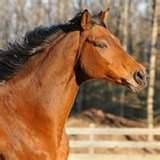"Affection for, and care of, his horse, is the trait, par excellence,
which distinguishes the German dragoon from the English."
The German would sell everything to feed his horse;
the English would sell his horse itself for spirit . . . . .
In the Peninsula the only means of enforcing some attention to
their horses amongst our English regiments was to make every
man walk and carry his saddlebags whose horse died or was ill."
(- Captain Mercer, British artillery)

The stable boy’s eyes grew wide at the sight of the approaching, British horseman. Although one of the most frequent visitors at the tavern, this officer’s new mount was, to say the least, most imposing. Unlike the other mounts commonly used by the British dragoons, this officer chose to ride a Hanoverian stallion. And what a stallion he was. At 17.2 hands, this magnificent animal dwarfed most of the others employed by the British cavalry, and even bested the mounts of the French Cuirassier that were generally a bit larger than their British adversaries. The stallion’s chestnut coat glistened in the sunlight, a tribute to the excellent care to which he was afforded. Supple muscles rippled as he walked, leaving no doubt as to the power that would be contained in the charge of so magnificent an animal. Having tended many horses in his young career, the stable boy immediately recognized the fact that the horse’s tail was undocked. Definitely a violation of regulations for the British cavalry, but one on which the horse’s rider would not compromise. His rider, you see, was not British at all. Like the magnificent animal himself, his rider was Hanoverian.
The Hanoverian Guardsman reigned in his horse beside the wide eyed, stable boy. With a kind smile at the lad, the dragoon dismounted. Gripping the reins under the horse’s muzzle, he spoke to the animal in German. “Jetzt warden Sie ein suter Kerl und geben Sie nicht diese jungen Burschen Probleme heute”, said the cavalry officer. The horse turned his muzzle toward his rider’s face and snuffled, seemingly understanding and agreeing to the stated rules of engagement. The Hanoverian officer smiled and scratched the horse’s nose before turning to face the young lad. In very good English, with only a hint of a German accent, he said, “I trust you will take very good care of him as usual?”
Smiling back at one of his favorite officers, the young boy replied, “Yes, sir, Brigadier. You know I will.”
The Hanoverian officer reached out and tousled the young man’s hair, “Yes, I know you will. You always do.”
Reaching into his pouch, the Hanoverian Brigadier pulled out two schillings, twice the going rate for a stable fee, and handed them to the young lad. “I shall give you another when I return, if you have done your job well.”
The boy’s grin widened as he accepted the coins. Perhaps it is a privilege of rank, but this particular officer had always paid him well for his services. “I will have him groomed and brushed upon your return, sir; the most excellent treatment befitting his status.”
“Very good”, said the Hanoverian officer as he stepped beside the horse’s saddle. Although he was carrying his own broadsword on his waist, the cavalryman retrieved a similar weapon that had been strapped to his saddle. The boy had seen this action performed many times by this particular officer who often entered the tavern with two swords, and typically departed with only the one.
As the officer started toward the Rhine Tavern carrying the second sword in his left hand, the boy suddenly realized that he had never asked the horse's name. “Sir”, he called after the red coated officer, “what is his name”, he asked as he nodded toward the fine stallion.
“His name”, replied the Hanoverian Brigadier, “is Teddy‘s kleine Tänzerin. I, however, simply call him Ted.“
With a final grin at the young lad, the Hanoverian officer turned and entered the Rhine Tavern carrying the second sword.





